Melody Maker Band Breakdown
Compiled by Steve Lake
Pictures by Barrie Wentzell
IT WAS five years ago
that, in the face of local apathy, Christian Vander set about forming Magma.
Vander, initially a jazz drummer, and one with a pedigree as long as your
arm, had become scornful of the abilities of his jazz improvising contemporaries.
He could find no one that shared his passion for the musical and spiritual
path adopted by the late John Coltrane, and, somewhat disillusioned, he ultimately
abandoned the jazz scene and took whatever commercial gigs were available.
Thus it was that at one point in 1969, Christian found himself laying down
a half-hearted off-beat behind Arthur Conley on a tour of Italy.
On returning to France, he found that a number of French rock groups had sprung
into existence, possibly motivated by the lack of visiting talent. Amongst
these bands were Triangle and Martin Circus, unknown over bore, but for a
while fantastically successful in France.
"The audiences were on their knees before these bands," recalls
Vander, "and everyone was telling me that they were tremendous. I knew
differently. There was nothing there at all."
So Vander decided that he'd alter the listening habits of France by forming
his own band.
His dream was to realise this by playing music that was spiritually as well
as physically satisfying.
The problem was finding the right musicians. There were initially no virtuoso
jazz players that were prepared to attempt Christian's experiment, so Vander
looked instead for people Who were not necessarily great players, but who
had character and imagination and energy.
Surprisingly, the first musicians that wanted to play with him were the horn
players from Johnny Halliday's band, who were honking and riffing themselves
to sleep every night, playing music in which they had neither faith nor interest.
Thus it was that the first inception of Magma was, by Vander's own admission,
"Musically atrocious".
A twelve-piece band, it incorporated the Halliday front-line, a free jazz
double bass player, Laurent Thibault on electric bass, who was later to produce
the first album ("a lovely guy, but he couldn't play in time"),
Eddy Rabbin on keyboards, the excellent Claude Engel on guitar, and Rene Garber
on vocals.
René, who rejoined the band last year as a contrabass clarinettist,
suffered from an inability to sing in tune, and has since returned to music
college to study pipe organ.
But from shaky beginnings, Magma gradually took off, having picked up Klaus
Blasquiz at a demo studio, when Garber had failed to turn up for the recording.
Vander had decided that the band shouldn't sing in French as the language
is essentially a weak sounding one, and as he couldn't speak any other language,
he invented his own, full of gutteral noises, and strange Teutonic syllables,
perhaps instinctively reflecting Vander's own background, for his roots are
not in France, but rather in Poland and the Baltic forests - his grandfather
was a nomadic gypsy violinist.
But to make the new language functional, Vander sketched out a kind of outer-space
morality play, a continuing rock cantata entitled "Theuz Hamtaahk"
being a multiple-part story of relationships between Earth and an imaginary
Earth-colonised planet named Kobaia.
Using this unlikely plot, Vander has created a sci-fic microcosm that bulges
with all manner of contradictions and controversies, using the theme to propose
all manner of arguable points.
Among these, that tyrants are, or can be, guides for civilisation, and that
wisdom and enlightenment can only be achieved via punishment.
Strong stuff, and the recorded tales of Kobaia so far centre around damnation
rather than salvation, with multiple cyclic disasters much in evidence.
To date there've been three Magma albums: "Magma" (French Phillips
63595.001/2 -a double album), "1001 Degrees Centigrade" (French
Philips 6397.031), and " Mekanik Destruktiw Kommandoh" ( A &
M SP-4397).
Of these, only
the A & M record is widely available in this country, although the first
two may be obtained from better import shops.
It has to be emphasised,
however, that it's not just in lyric content that Magma are a force apart
from the rest of rock.
Musically, they're
more far-reaching than any other band I can think of, and they absorb influences
from literally every music form, taking in elements of Bartok, Stockhausen,
Carl Orff, Wagner, Coltrane, Ellington, fragments of European folk musics,
oriental drones, yet all the time retaining a rock'n'roll vitality, with explosive
use of dynamics.
They breeze effortlessly
through crippling time changes, yet without sounding overly "intellectual"
or "tricky". Indeed, at recent English Magma gigs, idiot dancers
have been observed happily getting it on in 7/4 and 9/4, something unthinkable
at, say, a Soft Machine concert.
And speaking of
the Softs, it's interesting to recall that their "Third" was hailed
as a masterpiece of invigorating invention and we were told that the bands
"crucial importance in the future of popular music cannot be denied."
That's as maybe,
but it's fascinating to observe that Magma's first album is exactly contemporary
with "Third", and in compositional and instrumental terms it far
outstrips the Softs' record, although the two bands at this period shared
a certain unity in their use of horns.
The principal reed
player on all of Magma's recordings has been Teddy Lasry, who's no longer
with the group, but is far too important to leave out of any history.
Lasry's departure
has not been one of choice, but the saxist/flautist is only partially-sighted
and cannot take the strain of file on the road.
Nonetheless, Lasry
helped shape the direction of the band, and contributed several compositions,
notably "Sohia" and "Iss Lansei Doia", to Magma's repertoire.
Lasry still performs
with the band occasionally in France, where the group play six-hour long sets,
a somewhat daunting prospect, since the two-hour concerts they've given in
England have proved to be the ultimate sensory overload.
Even now, Magma
continues its unstoppable path through Britain leaving behind a string of
standing ovations, and a legion of new believers.
Magma's self-styled
"Zheul Music" is like nothing else ever heard by English audiences,
and yet it's met with an open, positive response almost everywhere the band
has played.
Christian Vander
has been drumming for more years than he cares to remember, but it looks as
though his time is finally at hand.
EQUIPMENT
KLAUS BLASQUIZ : African and classical castanets, cowbells, sleigh bells, Brazilian "Agogo" bells, Mexican claves, Tibetan and Indian bells, African Rapetta, Brazilian Carioka, Glockenspiel, triangle, Zildjan cymbals.
CLAUDE OLMOS : Jacobaca guitar, with position of controls altered for left-handed play. Fender strings, Ampeg V4 amplifier.
GERARD BIKIALO : Fender electric piano, Schaller wah-wah pedal, Ampeg V4 amplifier.
MICHEL GRAILLER : Fender 13 electric piano, with Fender fuzz and wah wah pedals, Spherosound Farfisa Organ, Hohner D6 Clavinet, Ampeg V4 amplifier.
JANNIK TOP : Fender Jazz bass, tuned as a cello, with strings in fifths, thus - A, D, G and C. Schaller volume pedal, Ampeg SVT amplifier.
CHRISTIAN VANDER : There was some difficulty here in ascertaining the measurements of some parts of Christian's kit in English units. Sa the list that follows is an amalgam of metric and English measurements - work it out for yourself! Black Gretsch drum kit, with 47 cm bass drum, 12" top tom-tom, 14" bass tom-tom, and 14" chrome snare. Cymbals: two 55 cm ride cymbals, one 45 and one 50 cm crash cymbal, plus 36 and 38 cm, hi-hat cymbals, all Zildjan plus one 50 cm Chinese cymbal. Various sticks and beaters, plus maraccas.
MICROPHONES : Various, all by Shure.
P.A. : Magma at present don't have their own P.A. One is shortly to be constructed by Claude Venet.
Gérard Bikialo
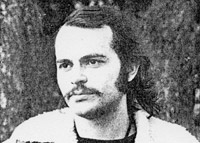 THE
young Gerard Bikialo's musical career was almost over before it was begun.
A child prodigy at the piano, he used to travel 75 kilometres unaccompanied
from Montargis to Orleans at the age of nine, two days every week.
THE
young Gerard Bikialo's musical career was almost over before it was begun.
A child prodigy at the piano, he used to travel 75 kilometres unaccompanied
from Montargis to Orleans at the age of nine, two days every week.
The purpose of this exercise was to study at the Orleans conservatory, and
it was ideal training for a youngster set on being a concert pianist.
Gerard's junior school head teacher thought differently, and banned him from
attending the music college, effectively terminating his career.
Music was abandoned, but not forgotten, and nine years later, when Gerard
was at University in Paris, he began to do gigs with dance bands and all sorts,
before forming his own rock and roll band, the proceeds from which he put
towards further piano lessons at Paris Conservatory. Meanwhile he was studying
mathematics and psychology.
"But my heart wasn't really in that, eventually I dropped out and decided
to devote my life to playing music."
Once again, he was thwarted by external situations. The military demanded
that he do his national service. That over, he decided to enrol at the Conservatory
as a full-time student, studying piano and saxophone.
"I studied on alto sax, because that's the easiest to learn, but later
I got into tenor as well.
"It was a drummer called Christian Moran who introduced me in Magma music.
He had the first album, and we just played the thing over and over, all night
long. I'd never heard anything like it"
Four years later, Vander and Moran were kicking around ideas for a part-time
percussion band, and Vander happened to mention that Magma was currently without
a pianist. Moran suggested Bikialo. Eventually Gerard was asked to join Magma.
"I was terrified. Really scared. Everybody in the group was a virtuoso
musician, and I really didn't think I could do it. I'd only ever played with
money-orientated guys. Still, it hasn't worked out too badly."
Michel Grailler
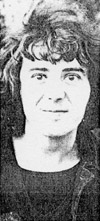 IT'S
probably been more difficult for Michel Grailler to adapt to the rigorous
discipline that Magma imposes than it has for any other band member.
IT'S
probably been more difficult for Michel Grailler to adapt to the rigorous
discipline that Magma imposes than it has for any other band member.
Michel plays electric piano, clarinet and organ and has a long established
reputation as one of France's leading jazz players.
He's worked with Charles Tolliver, Slide Hampton and Steve Lacey, and recorded
with Phil Woods, Johnny Griffin, Ted Curson and Hank Mobley.
Aside from which, he's achieved a multiple piano album with three other keyboard
players (amongst them, Christian's stepfather, Maurice Vander), and played
and recorded with Barney Willen's band, Moshi. For three years he shared front
line duties with Jean-Luc Ponty in the violinist's group.
Naturally a certain amount of flamboyance and flair for improvisation was
required to fulfil these posts, and after such "freedom" it was
hard to come to terms with Magma, where soloing isn't outlawed, but where
ego trips are frowned upon.
"A long time ago I realised that as an improviser I could never match
any of the giants, and I readily admit that for me, freedom is most likely
to be found by playing very structured music.
"Even so, it's taken me a long while to accept that. This is actually
my second period in Magma.
" I just was not strong enough to take the music first time around, but
now I'm adjusting. All the same, controlling one's indulgence is a never-ending
task."
Klaus Blasquiz
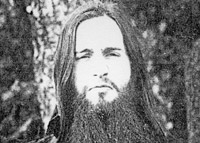 AT
THE outset of a Magma performance it will probably be the noble, operatic
gestures of Klaus Blasquiz that first catch your attention. One hand on his
heart and the other clawing at the air in the grand, stylised tradition.
AT
THE outset of a Magma performance it will probably be the noble, operatic
gestures of Klaus Blasquiz that first catch your attention. One hand on his
heart and the other clawing at the air in the grand, stylised tradition.
The voice too, has an operatic precision, immensely powerful, and with perfect
pitch, and a vast range of octaves sufficient to make Beefheart, Sly, and
Annette Peacock nervous.
One minute he's scat singing high and free, and the next adding a sub-baritone
melody lire to Magma's symphonic structures.
"I'm trying to widen my range," he says, demonstrating the two ends
of his spectrum without the slightest effort, rattling the floorboards with
a terrifying croaking noise.
Klaus is from France's Basque country, long famed for its singers, and began
singing in churches with his family, before getting harmony parts in various
local choirs.
Just as with many English musicians, he began taking an interest in rock and
roll at Art College, being initially turned on by Elvis Presley.
Later he formed various semi-pro bands of his own, singing Beatle songs, Buddy
Holly, Eddie Cochran and others. Later he earned a local reputation as a fine
blues singer, having long abandoned his Basque roots, and adopted the conventional
Americanese.
It was Vander who motivated Klaus to utilise the knowledge he'd acquired as
a child. Klaus just happened by fate to be at Magma's first demo recording.
He was a friend of Claude Engel, the original guitarist and had turned up
uninvited at the studio.
As Magma were negotiating a few new riffs, Klaus began singing absent-mindedly
to himself. Vander stopped playing. "That's the voice that the music
needs," he said.
Klaus declined the offer first time around, deterred by the untogetherness
of the original band. Later he relented. He's been with Magma ever since,
and bas seen some forty personnel shuffles.
Although the singer has not as yet contributed any compositions to Magma,
he's passionately devoted to the music. "Magma is my life," he says,
with a conviction that doesn't allow for scepticism.
Jannik Top
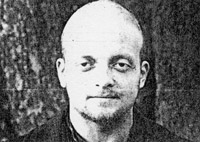 TO
AN outsider, Jannik Top is certainly the weirdest member of Magma. A small,
bald-headed man, with a bore-crunching handshake and quite the most startling
bass guitar technique you've ever seen, Jannik is also a mystic and philosopher.
TO
AN outsider, Jannik Top is certainly the weirdest member of Magma. A small,
bald-headed man, with a bore-crunching handshake and quite the most startling
bass guitar technique you've ever seen, Jannik is also a mystic and philosopher.
Rather than answer questions about his past, the mysterious Top produced a
hand-written piece of prose.
"This has the answers in all the questions you could ever ask,"
he said, and began to read. The rest of the band seemed overwhelmed by the
bass man's profundity.
Space doesn't permit me to print the whole of Jannik's epistle, but here's
a brief excerpt:
"Music doesn't aim to instil one person's dogma in another's mind, but
like all arts, can contain an element of knowledge. And ail aspects of life
are arts. The art of communication, with oneself and with others.
"A human being appears to be a touchable, palpable vehicle, governed
by certain physical laws. But the body is merely a vehicle, and there's another
vehicle
formed by the disassociation of the body with substances that surround us.
"This concept of layers can be illustrated in the conscience, and is
paralleled in art by attempts to get out of the eternal 'for and against'
struggle.
"What Magma are aiming for is a kind of total art, absolute communication,
the kind of art that built the pyramids. That are is not dead."
Christian. Vander courteously filled in details of Jannik's past. Classically
trained as a cellist and double bass player, at Marseilles Conservatoire,
Vander discovered Jannik playing bass guitar in a small club, in a band called
Troc, fronted by former Brian Auger vocalist Alex Ligertwood.
"I was overwhelmed," the drummer recalls. "I couldn't hear
the other musicians, all I could hear was this beautiful bass guitar concerto,
and I knew that I had to have him in Magma, although I realised that his inclusion
would mean the destruction of the band in its current form. Jannik has changed
everything."
It appears that Jannik Top will continue to change Magma. His melodic, inventive
approach to the bass is certainly one of the major highlights of any Magma
performance. As a soloist, he's probably without par. Certainly, there's no
one. else in rock to touch him.
Claude Olmos
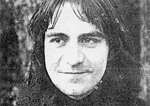 A
STONE rock 'n' roller is Claude 0lmos. He's seen it all, and done it all.
Played all the riffs from Chuck Berry through to Hendrix, Clapton and Beck.
A
STONE rock 'n' roller is Claude 0lmos. He's seen it all, and done it all.
Played all the riffs from Chuck Berry through to Hendrix, Clapton and Beck.
He's twenty-seven now, but at fifteen he was bopping with "Les Gentlemen",
apparently France's premier r'n'b band of the period.
Years later he came to Paris and played with Alice, Coeur Magique, and the
Alan Jack Civilisation, none of whom were up to much, he says.
Sessions proved to be an early financial salvation, and like Vander before
him, he accepted a number of commercial gigs, working for a while with Sylvie
Vartan.
And then for two years, Claude hung up his axe, and decided to study music.
He learnt to read, and whilst at college was introduced to the music of McLaughlin
and Larry Coryell, with whom he felt a certain affinity.
More importantly, he discovered African and Indian music, and these, he claims,
have had a more profound impact on his own style, than have any other guitarists.
He also discovered Coltrane, naturellement.
"I didn't like Magma at all when I first heard them. I was impressed
by their courage in being as far-out as they were, but it was during the period
when they had four brass players in the front line, and everybody seemed to
be shooting away in different directions.
"There seemed to be no unity of direction. So I went back to my rock
and roll bands.
"Then a year later, Jannik insisted that I came to one of Magma's concerts,
so I reluctantly came to a Sunday afternoon Youth Centre gig at St. Michel,
and I was absolutely knocked out.
"I was really dazed. I thought, wow, this is total madness. So after
the show I jammed with them and I've stayed ever since. But I'm still finding
my feet.
"The temptation is to play like either a rock or jazz guitarist, but
neither of those is right for Magma, so I'm trying to define a new style for
myself. But it's not easy."
Also none too easy is the way that Claude actually plays the guitar, Left-handed
and upside down, without reversal of strings.
Thus the bottom E is at the top, and when chording, Claude strikes upwards
rather than down. It looks weird as hell, but sounds fine.
Christian Vander
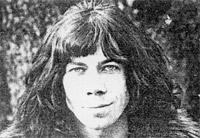 INTENSE.
That's a word that sums up Christian Vander's attitudes to life and music
both.
INTENSE.
That's a word that sums up Christian Vander's attitudes to life and music
both.
He seems to set himself almost impossible standards, and after the most stunning
of performances can be observed with his head hung in despondancy.
For five years now, he's led various versions of Magma, and he seems to be
never satisfied, always urging the musicians around him to play more, and
harder, and harder still.
In his youth he shunned local jazz musicians for their failure to recognise
Coltrane's genius, and it seems that Vander half-believes that he's inherited
Coltrane's mantle.
"Our music is not the same," he has often said, "but ours is
the same spiritual quest."
"Now for the first time, I've got musicians who are of one mind. Our
goal is the same, which is why this version of the band is the most successful
to date."
Christian generally declines to talk about the period prior to Magma's formation,
feeling that then was merely a preparation for now.
But repeated inquiries and investigations reveal that he was Jean Luc Ponty's
drummer for a while, and has worked with other luminaries including the mighty
Grachan Moncur III, and Chick Corea.
Ultimately, however, Vander believes that a musician has to play music that's
truly his own. He loves Tamla Motown, and rhythm and blues, and early rock
music, and McCoy Tyner too.
"But it's not my music, you know. There is really no point at all in
being an imitator or a copyist. It's better that you don't play rather than
do that.
"Yet, very, very few musicians have the courage and conviction to search
deep inside themselves and play from their hearts, reflecting their own background."
Vander has in the past analysed his own musical background, and acknowledges
his gypsy heritage as something of great importance. Voodoo, exorcism, and
trance-inducing music, are all things that he has studied and he's fond too
of the grandiosity of German music and Russian opera.
Melody
Maker - March 9, 1974